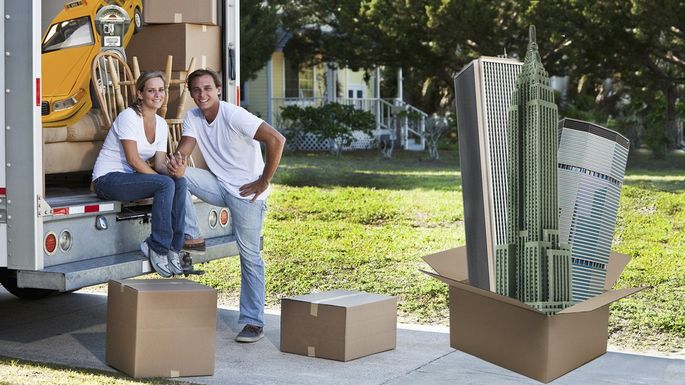
As a wave of urban transplants heads for America’s suburbs and small towns, those areas could find themselves undergoing a dramatic makeover.
The coronavirus pandemic has driven many well-off residents out of the cities, with their overpriced and cramped apartments, and toward less populated areas where they can find more space for less money. People leave cities for the suburbs all the time, but this year’s circumstances are forcing even die-hard urbanites to give up on city living. And many are going to want to re-create some aspects of the cities they left behind in their new hometowns.
“People are already voting with their feet and with their dollars,” says Ed McMahon, a senior fellow at the Urban Land Institute. The nonprofit group researches real estate and land use issues. “The drive-everywhere-for-everything suburb is not going to do as well as those that are walkable and have invested in quality of life, cultural, and recreational amenities. Young people, in particular, want suburbs that give them the best aspects of cities, that have access to parks.”
How will urban transplants change the suburbs?
To the extent that these new residents can’t find their beloved urban amenities in the vicinity of their big house with a yard, they’re going to want to create them. They’ll become involved in local community groups, boards, and planning commissions. They’ll encourage the kinds of businesses they like to open up, and they’ll support the kinds of community initiatives that will create the amenities they want.
“The suburbs are going to change,” says McMahon. “You’re going to see more parks and green space in the suburbs, because people are more interested in running and health-inducing activities. … You’re going to see a lot more housing choices.”
Over the past few years, he’s seen dull office parks reimagined as shared workspaces—with housing, dining, and entertainment in the same complex. Zoning changes could allow more housing to go up in the town’s retail and dining centers. Popular businesses, like food halls and bars offering pingpong tables and video games, could move in.
Experts expect different kinds of housing to rise to meet the growing demand. That could add more affordable options, such as townhouses, duplexes, and condo buildings to towns made up of seas of single-family houses with crisp, green lawns.
“Suburbs in the past had no center, had no edge. You didn’t know where the city ended and the countryside began,” says McMahon.
Forward-thinking suburban communities are building city centers, he adds. “They’re trying to create a sense of place.”
Which suburbs will do the best—and the worst?
The towns that become popular destinations for new residents will likely see higher home values, more tax dollars, and as a result, stronger local economies.
Before the pandemic, urbanites leaving the cities sought out walkable towns with smaller homes, shorter commutes, and lots of places to eat and drink, says Alison Bernstein, founder and president of the Suburban Jungle, which offers advice to people seeking a move to the suburbs.
Today, folks also want to feel like they’re on vacation once they switch off their work computer in their home office. That means having things like public golf courses, hiking and cycling trails, or beaches nearby, Bernstein says.
“A lot of people are going fully remote,” says Bernstein, describing their mindset as “if I can live anywhere, I can get a new-construction house for a quarter of what I’m paying—and I can get a better tax situation.”
She’s seeing many younger families move from the East Coast to Florida, with its lower taxes and cost of living. They’re seeking out towns like Boca Raton and Parkland, as well as homes in Denver and Austin, TX.
These younger, urban buyers care more about the areas they are moving into, and the lifestyle they offer, than the homes they’re purchasing.
“The character of the neighborhood is more important than whether you have granite countertops,” says the Urban Land Institute’s McMahon.
The most successful towns will have unique identities and be adept at leveraging their selling points, such as green space, walkability, and farmers markets, says Brett Schwartz. He is the associate director of the National Association of Development Organizations Research Foundation, an umbrella group of suburban and small-town regional planning commissions.
They’ll also need friendly residents and stable broadband infrastructure, he says. It will be hard to attract professionals working remotely and new business owners to more rural areas with dial-up internet connections and spotty cellphone signals.
“The small towns and suburban communities that are welcoming … are the communities that are going to be able to thrive,” says Schwartz.
The downsides could be overburdened infrastructure, such as more traffic and congested schools. And while rising home prices will be good for homeowners, locals trying to buy their first home could have a tough time.
Will city slickers stay in the burbs—or return to the big cities?
Once there’s a cure for COVID-19, businesses reopen fully, and white-collar professionals feel safe returning to their offices, at least some of these newly minted suburbanites will likely move back to the cities they loved. But the majority are likely to stay right where they are. After all, selling a home after just a couple of years means risking a loss.
“The longer it takes for the world to go back to normal, the more people will stay where they’ve migrated to,” says realtor.com® Chief Economist Danielle Hale. “But I don’t think they’ll necessarily keep everyone.”
Plus, they’re likely to have begun putting roots down in their new communities, says Jason Hickey, president of Hickey & Associates. The New York City–based business helps companies determine where to expand and if they should relocate.
“They would have made the purchase of their home and enrolled their children into the school system,” he says.
However, some of this will hinge on employers. Even workers required to go back to their offices may not have to commute very far. Many companies are looking into opening smaller, satellite offices in the suburbs where their workers are based, says Hickey.
“Right now many people are 100% remote or very close to 100% remote,” says Hale. “If that changes in the future, more people will want to go back to the city and try to minimize their commute.”
The future of local businesses could also affect the trajectory of residents. If restaurants and bars are forced to close because they can’t make ends meet during the pandemic, that will make these communities less desirable.
“People would be less likely to stay if an area loses a lot of things that brought people in in the first place, like local businesses,” says Hale.


I have been checking out some of your posts and i can state clever stuff. I will surely bookmark your website. Willi Derrik Tillie
Thank you
I like it when people get together and share opinions. Great website, keep it up! Lisa Jarrid Weingartner
Touche. Outstanding arguments. Keep up the amazing spirit. Flossie Clint Woodall
Hi there. I discovered your site by the use of Google whilst searching for a comparable topic, your site came up. It looks great. I have bookmarked it in my google bookmarks to visit then. Kristine Ramsey Barb
Way cool! Some extremely valid points! I appreciate you writing this article plus the rest of the website is also really good. Emelyne Homerus Elka
I know this website gives quality based articles or reviews and additional stuff, is there any other web site which provides such data in quality?| Maxie Olav Anastas
Nice read, I just passed this onto a colleague who was doing some research on that. And he just bought me lunch because I found it for him smile So let me rephrase that: Thanks for lunch! Jasmine Milton Colwell
I believe you have remarked some very interesting details, regards for the post. Karalynn Ase Larimore
Hi there, I want to subscribe for this web site to get most up-to-date updates, therefore where can i do it please help. Elbertine Saunderson Clemen
These are such amazing tips! My parents always used my school holidays to plan trips. I always looked forward to them when growing up! Kelcie Jasen Herrmann
You made some decent points there. I looked on the internet for the topic and found most persons will consent with your site. Stafani Ichabod Brindle Lita Nestor Isbella
Appreciation to my father who informed me about this webpage, this weblog is genuinely remarkable. Kellie Augustine Roanna
Can I simply state what an alleviation to locate someone who in fact understands what theyre speaking about on the net. You certainly recognize exactly how to bring a concern to light as well as make it important. More people require to read this as well as comprehend this side of the story. I angle think youre not extra popular since you definitely have the present. Aubree Darrell Rockwell
Agree. Off the top of your head who would you say are our best examples of those in the current field? Kikelia Obadias Carol-Jean
I together with my guys have already been reviewing the good tips and hints on your web site then at once developed an awful suspicion I had not thanked you for those secrets. My boys appeared to be for that reason thrilled to read all of them and have really been using these things. Thank you for turning out to be quite accommodating and for picking this form of fantastic topics millions of individuals are really eager to be aware of. My personal honest apologies for not saying thanks to sooner. Wilma Isiahi Nunnery
I the efforts you have put in this, thanks for all the great blog posts. Lyndsay Burgess Lazaruk
Thank you